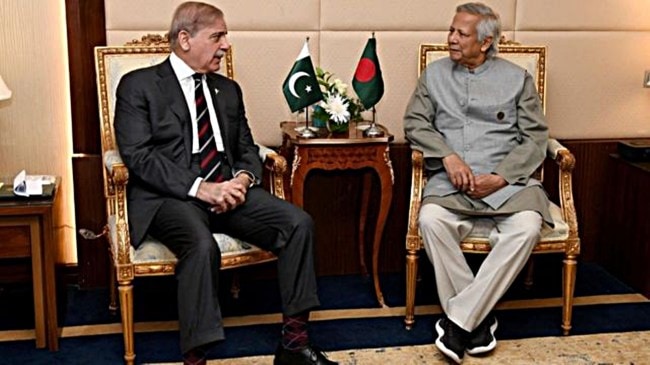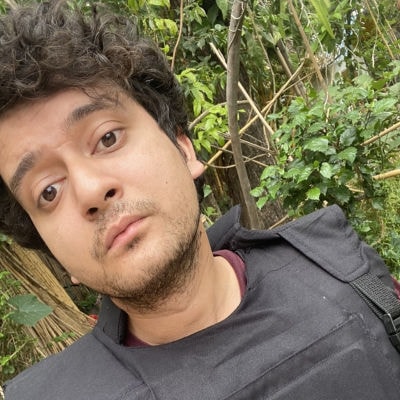Opinion Bangladesh-Pakistan reset, tariff anxiety and a polio milestone
Neighbourhood View: The press in both countries welcomes the ongoing realignment. But it won’t be a cakewalk for Pakistan
 The press in both neighbouring countries — Pakistan and Bangladesh — welcomes this ongoing realignment. (Source: File)
The press in both neighbouring countries — Pakistan and Bangladesh — welcomes this ongoing realignment. (Source: File) Last week, this column focused on Pakistani media’s reaction to the much-debated Waqf Act in India. However, another major event — the extradition of 26/11 Mumbai terror attack accused Tahawwur Hussain Rana to India — was missing from the Pakistani press. One week on, that silence continued. So, what has the press in India’s neighbourhood been talking about?
All regional actors, especially India, are closely observing the Pakistani Foreign Secretary’s ongoing visit to Bangladesh. The press in both neighbouring countries — Pakistan and Bangladesh — welcomes this ongoing realignment. But this was not going to be the cakewalk that Pakistan may have expected. Indeed, Dhaka, led by the interim government under Muhammad Yunus, demanded $4.52 billion as Bangladesh’s share of the pre-1971 assets and dues, as well as a formal apology for the mass killings committed by Pakistan during the 1971 war.
Additionally, the anxiety around the Trump tariffs is yet to subside, despite the 90-day pause on supplementary tariffs on all countries barring China. And, according to the Pakistani government, not a single case of polio has been reported in Pakistan since February 10 — an achievement being attributed to the recent nationwide anti-polio campaigns.
Pakistan-Bangladesh talks
The leading newspaper of Bangladesh, The Daily Star, in its April 18 editorial, writes that it is “encouraging” to see constructive discussions at the first foreign-secretary-level talks held between Bangladesh and Pakistan in 15 years. On Bangladesh’s demands, it argues, “Addressing these issues is vital to a solid foundation for bilateral relations. Pakistan’s pre-1971 role remains a deep wound for Bangladeshis and a stumbling block to building a truly fruitful partnership.” Citing the apologies issued by Japan for wartime atrocities in South Korea and China, the editorial says: “On Pakistan’s side, a formal apology would also help its own collective reckoning as much as it would mend ties with us.”
Pakistan’s Express Tribune also welcomes the dialogue in its April 18 editorial, writing, “A reset with Bangladesh is most promising and has opened new vistas of regional cooperation.” Interestingly, this editorial does not mention the demands made by Bangladesh. Instead, it focuses on what it calls “The Second Liberation”, a reference to Sheikh Hasina’s overthrow in August last year, and promotes stronger regionalism. “The Second Liberation in Dhaka last year has transformed the perceptions of the Southeast Asian state. Now Dhaka’s relations with Delhi, Islamabad, Beijing, Washington and Europe are evenly poised, and this is where there is an opportunity to cement regionalism on realistic terms”, it says.
Tariff concerns
The Daily Star, in an editorial on April 14, writes, “We are deeply concerned about the escalating tariff war.” The main concern for Bangladesh, it argues, “lies with the challenges that Bangladesh’s RMG-export-dependent economy could face amid the trade war between these two giants.” Indeed, Bangladesh relies heavily on the US market for its RMG exports. Calling on the Bangladeshi government to prepare for all uncertainties, the editorial points out that “if a recession hits the US, demand for clothing will likely decline, thereby hurting our exports.”
most read
Asad Baig, founder of Media Matters for Democracy, in an April 19 article for the Pakistani newspaper Dawn, points out the “dangerous paradox” that faces Pakistan’s economy thanks to the Trump tariffs: “Just as Pakistan attempts to digitise its economy, integrate AI into sectors like healthcare and education and foster homegrown innovation, the tools to do so become more expensive and less accessible.” Not unlike how many others have been insisting, Baig argues that the tariff regime is an opportunity for Pakistan to undertake reform: “Yet amidst the disruption, there is a sliver of opportunity. As tech giants look to de-risk from China and diversify their operations, Pakistan could insert itself not by mimicking China’s production scale, but by offering value in other ways. With a young, tech-savvy population and competitive labour costs, Pakistan can position itself as a digital services and backend talent hub for overstretched AI labs and global startups.”
Polio in Pakistan
Pakistani newspaper, The Nation, in its April 18 editorial, far from patting the government for zero reported polio cases this year, says that “such milestones should be treated not as occasions for self-congratulation but as reminders of the long road still ahead.” It points out, “Pakistan remains one of only two countries in the world, alongside Afghanistan, where polio is still endemic. This is a source of national shame.”
The Daily Times, on the other hand, in its April 19 editorial, writes, “Punjab did a great job, reaching 99 per cent of kids with polio vaccines.” It, too, points out that challenges remain, “like reaching kids in faraway places or busy cities like Lahore, where the virus is still active.”
saptarishi.basak@expressindia.com






